Of course, you can absolutely dispute errors on your credit report! It’s important to keep a close eye on your credit report and address any inaccuracies promptly. To begin the process, you will need to gather supporting documents that prove the errors on your report. This can include receipts, bank statements, or any other relevant proof. Once you have all the necessary information, you can contact the credit reporting agency to file a dispute. They will provide you with specific instructions on how to submit your dispute and what information you need to include. Remember to keep copies of all your documents and correspondence for your records. The credit reporting agency will then investigate the errors and notify you of their findings. Rest assured, disputing errors on your credit report is a standard procedure, and the agency will work with you to resolve any issues promptly.
Understanding Credit Report Errors
Credit report errors can have a significant impact on your financial standing. It is essential to understand what credit report errors are, the different types of errors that can occur, and why it is crucial to dispute these errors.
What are credit report errors?
Credit report errors refer to inaccuracies or mistakes that can appear on your credit report. These errors can range from simple typographical errors to more serious issues, such as incorrect payment information, unauthorized accounts, or identity theft.
Types of credit report errors
There are various types of credit report errors that can occur. These may include incorrect personal information, such as your name, address, or Social Security number. Additionally, errors can also involve inaccurate account information, such as late payments or accounts that do not belong to you. It is important to be vigilant in identifying these errors, as they can negatively impact your creditworthiness.
Importance of disputing credit report errors
Disputing credit report errors is crucial for maintaining your financial health. Inaccurate information on your credit report can lead to a lower credit score, difficulty obtaining loans, and even potential employment challenges. By disputing these errors, you can ensure that your credit report accurately reflects your financial history and prevent any undue negative consequences.
Reviewing Your Credit Report
Before disputing credit report errors, it is vital to thoroughly review your credit report. Here are the steps to effectively review your credit report:
Obtaining a copy of your credit report
To review your credit report, you need to obtain a copy from one of the three major credit bureaus – Equifax, Experian, or TransUnion. Under federal law, you are entitled to receive a free copy of your credit report annually from each bureau via AnnualCreditReport.com.
Identifying errors on your credit report
Once you have your credit report in hand, review it carefully to identify any errors. Pay close attention to personal information, account details, payment history, and any accounts that you do not recognize. Highlight or make note of the errors you find.
Gathering evidence to support your dispute
To effectively dispute credit report errors, it is essential to gather supporting evidence. This evidence may include bank statements, receipts, cancelled checks, or any other documentation that can substantiate your claim. Keeping a record of all interactions and correspondence related to the dispute is also important.
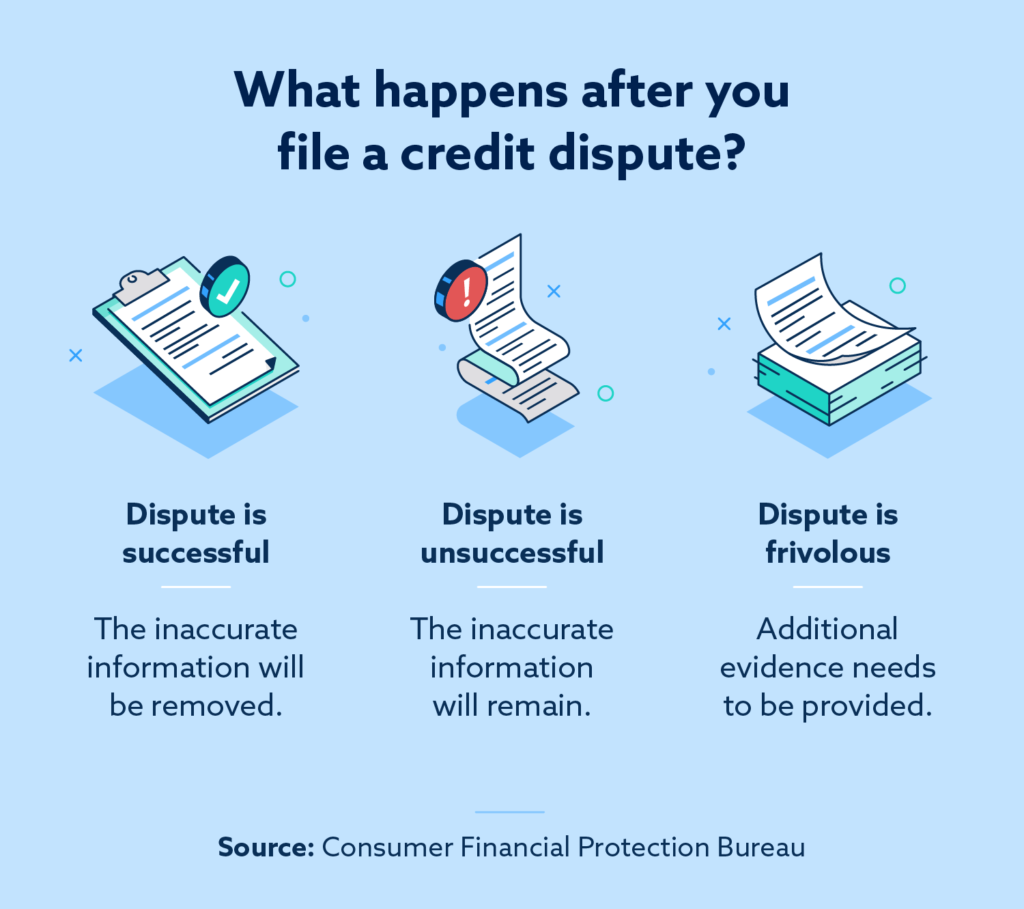
This image is property of www.lexingtonlaw.com.
Disputing Credit Report Errors
After reviewing your credit report and identifying errors, the next step is to dispute these errors with the credit bureaus. Follow these steps to effectively dispute credit report errors:
Sending a dispute letter
Write a dispute letter to the credit bureaus that clearly outlines the errors you identified and explains why they are inaccurate. Be specific and provide as much detail as possible. Remember to include your name, address, and any supporting documentation that can help prove your case.
Including necessary information in your dispute letter
In your dispute letter, include your full name, current address, and Social Security number to ensure accurate identification. Clearly state the errors you are disputing, provide any relevant account numbers, and request that the errors be investigated and corrected.
Methods to submit your dispute
You can submit your dispute letter to the credit bureaus through various methods. One option is to mail it via certified mail with a return receipt requested, ensuring proof of delivery. Alternatively, many credit bureaus allow disputes to be filed electronically through their websites. Choose the method that suits you best.
Working with Credit Bureaus
Once your dispute letter is submitted, it is important to understand the role of credit bureaus and how to effectively communicate with them. Consider the following points:
Understanding the role of credit bureaus
Credit bureaus function as information repositories that collect and maintain individual credit data. They are responsible for investigating and resolving disputes regarding the accuracy of the information on your credit report. Understanding their role helps in navigating the dispute process.
Communicating with credit bureaus
Maintaining open lines of communication with the credit bureaus is crucial during the dispute process. You may receive correspondence from them requesting additional information or providing updates on the investigation. It is essential to respond promptly and provide any requested documentation to aid in the investigation.
Requesting an investigation
After receiving your dispute letter, the credit bureaus will initiate an investigation into the errors you have identified. They have a legal obligation to investigate and, if necessary, modify or remove inaccurate information from your credit report. Be patient throughout the process as investigations can take varying amounts of time, typically between 30 and 45 days.
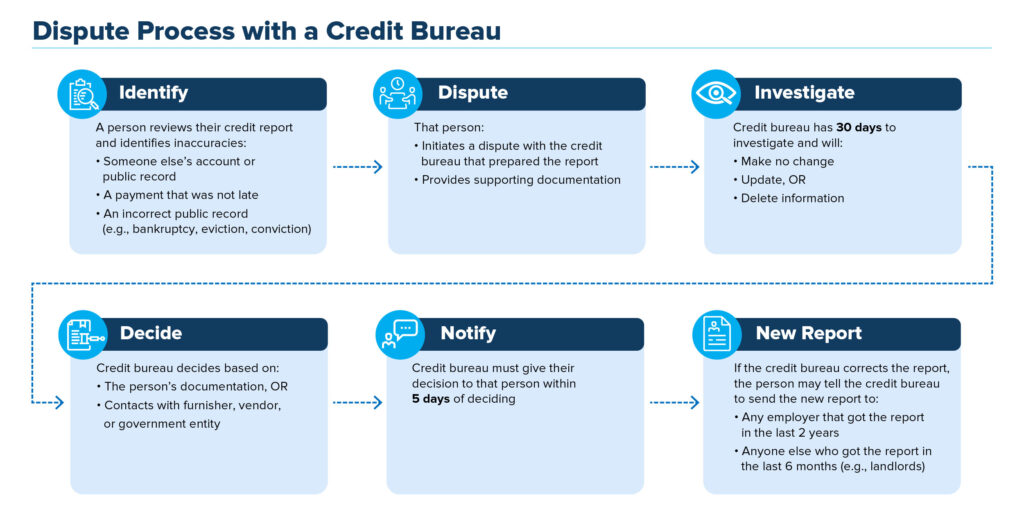
This image is property of consumer.ftc.gov.
Contacting the Information Provider
In addition to working with the credit bureaus, it may also be necessary to contact the information provider directly to dispute credit report errors. Consider the following steps:
Identifying the information provider
The information provider is the entity that furnishes your financial or credit-related information to the credit bureaus. This can be a bank, credit card company, or any other organization that reports your financial activities. Identify the specific information provider associated with the disputed error before proceeding.
Sending a dispute letter to the information provider
Draft a separate dispute letter for each information provider and clearly explain the errors in question. Include any relevant documentation that supports your case and request that the provider investigate and correct the inaccuracies. Be sure to send the letter via certified mail for proof of delivery.
Following up with the information provider
After sending the dispute letter to the information provider, it is important to follow up to ensure that your dispute is being addressed. Keep a record of all communication and maintain regular contact until the issue is resolved. This will help in case further action is required.
The Investigation Process
During the investigation process, it is important to understand the obligations of the credit bureaus as well as the expected timeframe for completing the investigation. Consider the following points:
Credit bureaus’ obligations during the investigation
Credit bureaus have a legal obligation to conduct a reasonable investigation into the disputed errors. They are required to contact the information provider, review the evidence provided, and determine if the reported information is accurate. If they cannot verify the accuracy, the bureaus must remove or correct the errors.
Timeframe for completing the investigation
The Fair Credit Reporting Act mandates that the credit bureaus must complete the investigation within 30 days of receiving your dispute letter. In some cases, this period may be extended to 45 days, depending on the complexity of the dispute. It is important to be patient during this time and follow up with the credit bureaus as necessary.
Receiving the investigation results
Once the investigation is complete, the credit bureaus will provide you with the results in writing. If the errors were found to be inaccurate, the bureaus will modify or remove the erroneous information from your credit report accordingly. Review the results carefully and ensure the necessary corrections have been made.
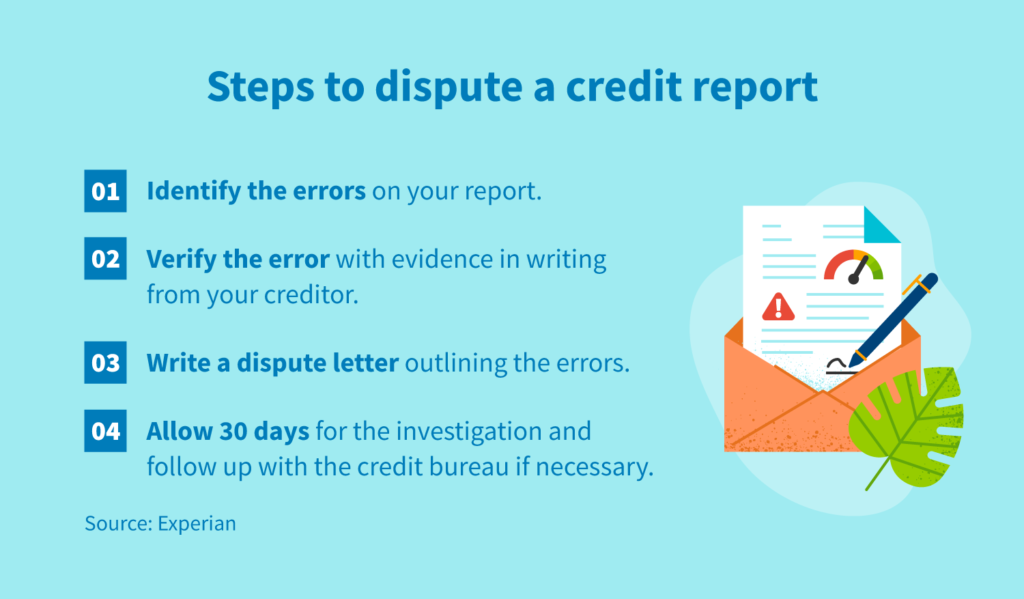
This image is property of www.creditrepair.com.
Resolving Disputed Errors
After the investigation process, it is crucial to take steps to ensure the error is corrected and to maintain the accuracy of your credit report. Consider the following actions:
Correcting the error on your credit report
If the investigation results indicate that errors were found, the credit bureaus are responsible for correcting or removing the inaccurate information from your credit report. Monitor your credit report after the investigation to ensure the necessary corrections have been made.
Requesting an updated credit report
After the errors have been corrected, it is advisable to request an updated copy of your credit report from all three credit bureaus. This will allow you to verify that the corrected information has been reflected accurately and that your credit report is now error-free.
Monitoring your credit report
Once the dispute has been resolved and the errors have been corrected, it is essential to maintain good credit habits and regularly monitor your credit report. Check your credit report periodically to ensure accuracy and promptly address any new errors or discrepancies that may arise.
Seeking Professional Help
While disputing credit report errors can be done independently, there are instances when professional assistance may be beneficial. Consider the following factors:
When to consider professional assistance
If you find the dispute process overwhelming or time-consuming, or if you have complex credit report errors, it may be wise to seek professional help. Credit repair companies specialize in helping individuals navigate the dispute process and can provide expertise and support.
Benefits of hiring a credit repair company
Hiring a credit repair company can offer several benefits. These companies have knowledge and experience in dealing with credit bureaus and information providers, potentially increasing the effectiveness and efficiency of the dispute process. They can also provide guidance on improving your credit score and maintaining good credit habits.
Ensuring legitimacy of credit repair services
If you choose to hire a credit repair company, it is essential to ensure their legitimacy. Research each company thoroughly, read reviews, and check for any potential red flags. Choose reputable organizations that comply with state and federal regulations, and be cautious of any company that guarantees specific outcomes or requests upfront fees.
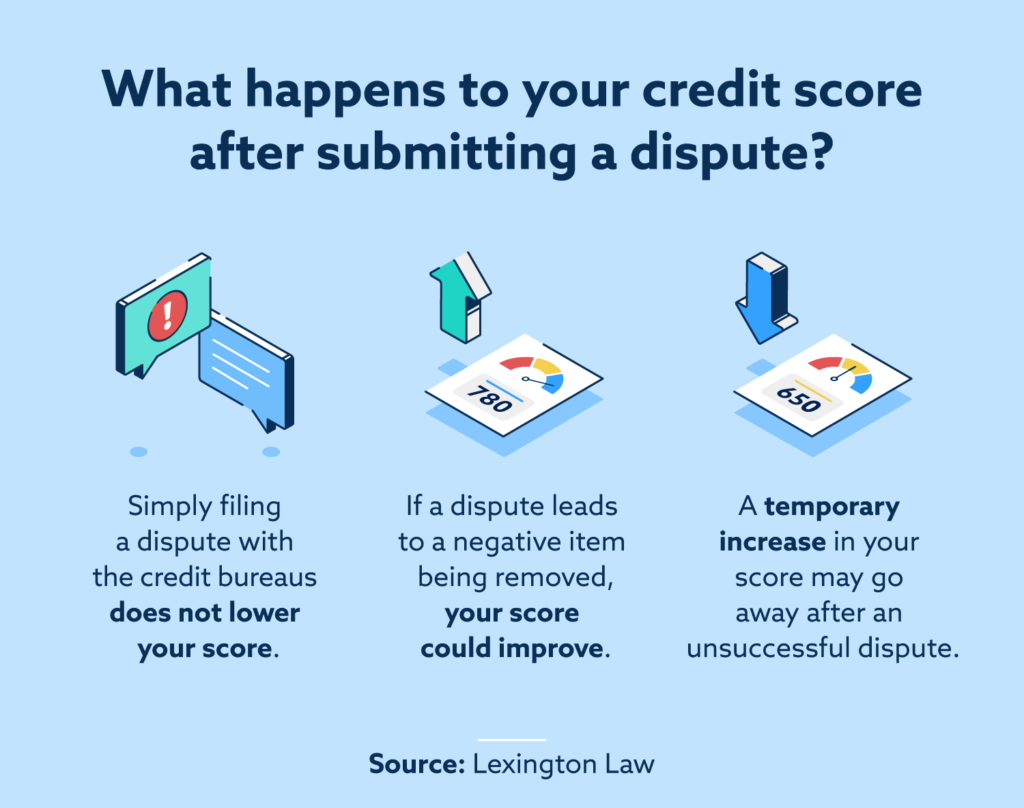
This image is property of www.lexingtonlaw.com.
Maintaining Good Credit Habits
While disputing credit report errors is crucial, it is equally important to build and maintain good credit habits. Consider the following points:
Importance of building and maintaining good credit
Good credit is essential for obtaining loans, mortgages, and favorable interest rates. By consistently practicing responsible credit usage, such as paying bills on time, keeping credit card balances low, and avoiding unnecessary debt, you can ensure a positive credit history.
Tips for improving your credit score
To improve your credit score, focus on paying all bills on time, reducing your overall debt, keeping credit card balances low, and avoiding opening multiple new accounts within a short period. Consistently practicing these habits can lead to an improved credit score over time.
Regularly checking your credit report
Even after resolving credit report errors, it is important to regularly check your credit report to ensure its accuracy. You can request a free copy of your credit report annually from each of the three major credit bureaus. Regularly monitoring your credit report empowers you to address any new errors or discrepancies that may arise promptly.
Dealing with Rejected Disputes
In some cases, disputes may be rejected by the credit bureaus or information providers. Here’s what you should know if your dispute is rejected:
Understanding reasons for rejected disputes
Disputes can be rejected for several reasons, such as inadequate supporting documentation or failure to provide sufficient details about the error. It is crucial to review the rejection notice carefully to understand why your dispute was not accepted.
Appealing a rejected dispute
If your dispute is rejected, you have the right to appeal the decision. Review the rejection notice to understand what additional evidence or information is required. Submit the necessary documents and correspondences to support your case, clearly explaining why you believe the rejection was incorrect.
Alternative options for resolving disputes
If an appeal is unsuccessful, and you still believe the error is inaccurate, there are alternative options for resolving the dispute. These may include seeking legal advice, filing a complaint with relevant regulatory bodies, or even pursuing a lawsuit, depending on the nature and severity of the error.
Disputing credit report errors can be a complex process, but it is necessary to ensure the accuracy of your credit report and protect your financial well-being. By understanding the various types of errors, following the proper dispute procedures, and maintaining good credit habits, you can establish a solid credit history and safeguard your financial future. Remember, if you encounter challenges during the dispute process, professional assistance is available to provide guidance and support every step of the way.
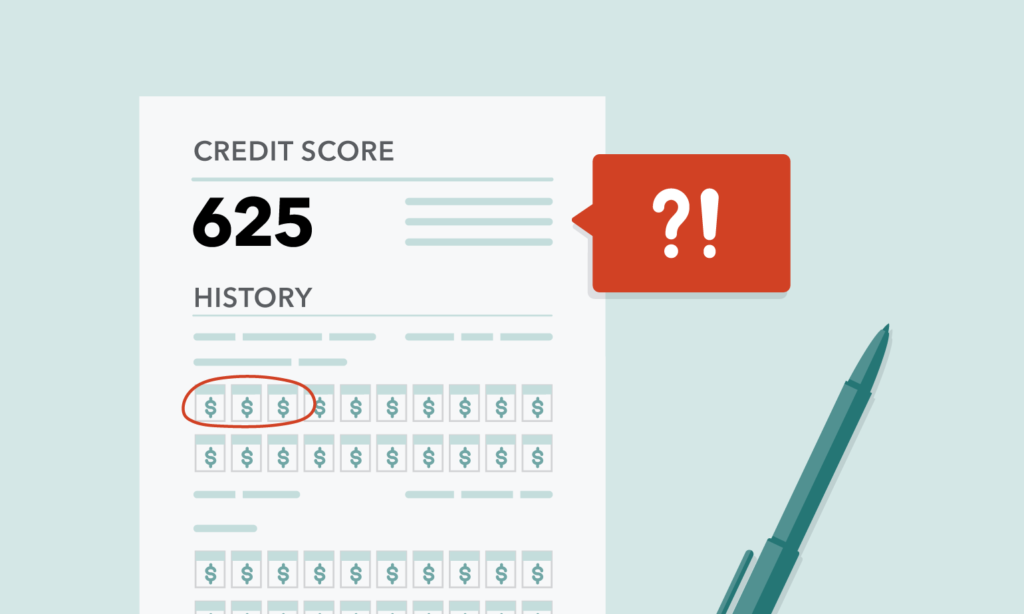
This image is property of s3.amazonaws.com.
